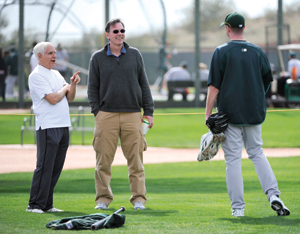Few team owners have been forced to show as much patience in recent years as Oakland A’s managing partner Lew Wolff. With his club’s bid to move out of the aging O.Co Coliseum to downtown San Jose on hold amid a league study of the matter that’s now in its fifth year, Wolff doesn’t have either the “yes” answer he covets from MLB Commissioner Bud Selig or the definitive “no” that would at least bring clarity to the situation.
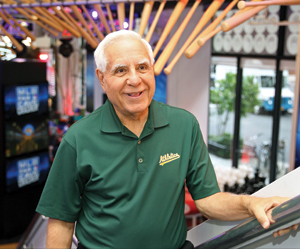 |
Photo by: PATRICK E. MCCARTHY
|
While the wait and the territorial objections from the neighboring San Francisco Giants continue, Wolff has been working a delicate balancing act. Largely through the immortalized-by-Hollywood acumen of general manager Billy Beane, the A’s won the AL West last year with baseball’s second-smallest payroll. The 77-year-old Wolff, a fraternity brother of Selig’s at the University of Wisconsin, has also had to carefully express his frustration over the delays without disrupting his role as a member of the league’s collective of team owners or violating a loose gag order from Selig on the issue.
In the meantime, Wolff has sought to develop other facets of the organization, including a long-term deal signed this year to redevelop and occupy the Chicago Cubs’ old spring training facility, HoHoKam Park, in Mesa, Ariz.
Wolff, a Los Angeles-based real estate developer, recently spoke in New York with SportsBusiness Journal staff writer Eric Fisher.
■ Despite your revenue challenges, the club won the division last year, and is competitive once again this season. Billy is certainly a celebrated executive. But what do you see as the key factors in your on-field success? Does the success surprise you?
WOLFF: Going back two years ago, before spring training, there was a meeting with Billy and all his guys and he made it clear that he had to make some big moves, some tough moves. Moves like trading [closer Andrew] Bailey and [starting pitcher] Gio Gonzalez. But he sort of set a goal. Last year, he reached the goal faster than any of us imagined. It’s not a surprise to me, though. I think we’re going to be a competitive team for a long time to come. This is all following a plan. There is a discipline within a payroll that is roughly 50 percent of our revenue. The thing that does concern me is that in a couple of years, there are a number of our players that will become free agents.
■ The way the business is trending now, there is a real movement in baseball toward internal development and an increased emphasis on the draft. These are things you’ve been focusing on for years. Do you sense the rest of the industry gravitating toward your thinking?
WOLFF: Yes, I think so. Especially this year. The combination of our success last year, the last couple of years, and the new CBA has given others a push in this direction. I think more people are looking at building a team as opposed to just collecting star power.
■ You look at the rest of the division, and there is a big gulf in TV revenue. Texas and the Angels just signed big deals with Fox. Seattle just did its big deal with DirecTV. Houston is trying to get its new RSN with Comcast established. It seems like you’re the outlier now.
WOLFF: I would disagree with that. I think we have been one of the first, not a mega-contract, but one of the first new contracts of this era. I think the Giants, too. I think our deal [about $45 million a year] is sort of in the middle of the contracts.
■ But if you look over the next decade, there are certainly going to be more clubs heading toward and exceeding nine figures annually.
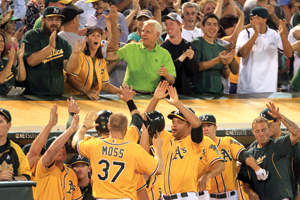 |
Wolff’s GM, Billy Beane (center), continues to make moves that keep Oakland competitive with bigger-payroll clubs.
Photos by: GETTY IMAGES
|
WOLFF: We think we could get to that if we had a new ballpark. Plus, we have an out in ourcontract [with Comcast SportsNet] a few years down the road where we can reopen it [the option comes in 2023]. Time passes faster than you can imagine. So I think we’ll be OK in that area. We’re OK now, and it’s going to get better.
■ Getting to the facility issue, it’s been so much of what has defined you and the A’s franchise as a whole. It’s hard to discuss you and the team without quickly getting to the stadium issue. Has that been problematic or cast a pall on the rest of the team operations?
WOLFF: We have a fan base that is quite loyal. The field itself [at O.Co Coliseum] is an excellent playing field, at least until the end of the season when the Raiders start up again. I had lunch with [Raiders managing partner] Mark Davis, and he said he was a little worried about his players playing on a baseball field, that his players might get hurt. I said that wasn’t fair, that was my argument the other way. So we laughed about it. But seriously, neither team should have to play like that. Especially in August when they start their preseason. The field goes from an A+ to a C-.
■ Beyond that, what has your relationship been with the Raiders and Warriors, given that you have a somewhat unusual situation sharing your grounds with two other teams?
WOLFF: We’re all fairly compartmentalized. The Warriors have been no problem. In fact our offices are in the building where the [Oracle] Arena is. I snuck in and watched one of their games the other day. The Raiders, they also sort of march to their own drummer. We all do. Every so often, there’s a little bit of a conflict. For example, the Warriors had one of their playoff games the other day the same day as one of our games. But we’ve been able to accommodate all of that. It’s not a major issue.
■ Speaking of relationships, what is yours with Commissioner Selig these days? You obviously have this long history together, but you haven’t had resolution on the facility issue.
WOLFF: I think the relationship is excellent. We have a little different view on timing of decisions. But there are so many other good things that baseball brings to us that I enjoy. I enjoy the committees he’s put me on. Thanks to Billy and his staff, we’re sort of a force. We’ve become a little more interesting to people. Winning helps. And I think Bud enjoys that. He’ll call me and tell me he was watching our game. We’re often the last game of the night anyway. The only statement that I’ve ever made about our situation is that I’ve explored everything to my knowledge I could to stay in Alameda County. And baseball has done the same thing. So we think there’s no plan that we’ve missed to stay where we are at. And we haven’t received any plans from Oakland. And that’s all I’ve really said even though I’ve been constantly vilified by some people. We’re not moving the team to Mars. We’ve never threatened to move outside of the state of California. And we’ve never threatened that if you don’t do ‘X,’ we’re moving to Texas or something. So it’d be nice to get this settled one way or another.
■ Even without making threats, is there a point, perhaps motivated by life planning, that you just decide it’s not worth the wait anymore?
WOLFF: No. I don’t think so. I don’t think there’s anyone that walks upright that wouldn’t agree we need a better venue. So whether I produce it in my era, which is short, or someone else, we have a lot of backup. We are building a soccer stadium in San Jose. People said that wasn’t viable either. There was no public money. But we can deliver if we have the opportunity. And we still don’t feel we’re leaving the area.
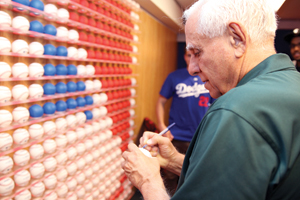 |
“For a lot of us,” Wolff says, “there’s still nothing more fun than a filled-up ballpark.”
Photo by: PATRICK E. MCCARTHY
|
■ Has your desire for a new venue been dulled by the delay?
WOLFF: I do not think so. But if I tire, the immediate backup available to me is strong and deeply committed. We are hopeful of extending our lease in Oakland for five years, thus our commitment to the Bay Area is solid. I am proud that we have never threatened to leave the area as a lever on anyone. We will only consider a move out of the Bay Area if all options are clearly exhausted.
■ Is there a succession plan laid out for the franchise? Does your son, Keith, get more involved?
WOLFF: Keith is building the soccer stadium. He’s in charge of that. He’s capable of doing it. Our succession plan is the fact we have a great existing staff who can implement a lot of aspects of running a stadium, such as selling sponsorships and tickets and so forth. We have that in place. And as far as the development side, Keith can do it. It’s not a succession plan in the sense that if I stop, he’s going to be Lew Wolff. But we just want to do what’s best for the team.
■ How are you getting along with the Giants these days?
WOLFF: There really hasn’t been a lot of communication. Their position, for reasons you have to ask them about, is that they don’t want us to move. They feel if we move further away, it’ll hurt their business. I obviously feel the opposite. But that’s really it. They’re happy to meet and discuss this. But to my knowledge, they’re not looking for a check. They really haven’t expressed any of that.
■ What is your level of confidence this gets resolved in the next year or two?
WOLFF: I prefer not to comment on that. I’m not sure. I haven’t been a great predictor on that.
■ Some of the Bay Area politicians appear to be getting more animated and impatient regarding this issue, and there have even been suggestions of lawsuits being filed. How difficult has that been to navigate?
WOLFF: The city of San Jose has been extremely patient with me. They want to have a baseball team. But in my business life, I have not often seen legal solutions to business problems work very well. And I’ve got to look at baseball in total. I don’t just look at this one issue. Look at all the other good things that have happened and are happening. I really don’t want to be associated in any kind of legal action against my partners.
■ You mention looking at baseball as a whole. How much of this stadium issue has been mitigated by the run of revenue growth the league has experienced?
WOLFF: I try to look at the overall balance sheet as opposed to one issue. And so, yeah, you look at the balance sheet. We’re in baseball. We’re having fun. We’re having success. We’re the beneficiary of things like the new television contracts, the new CBA. We’ve got a lot of accomplishments. The one thing we haven’t been able to do is get a path to a new venue. But that’s just one of many other things related to baseball, and most of the things related to baseball have been very positive.
■ With regard to the TV contracts, it seems like the new money is such that for the first time in the history of baseball, the sport is going to be primarily a media-driven entity as opposed to one that gets its largest share of revenue from attendance-related sources.
WOLFF: Obviously, it’s tilting that way. But the need remains for the fan experience, for it to be fun to go to the ballpark, to really enjoy it. For a lot of us, there’s still nothing more fun than a filled-up ballpark. And we could have that [for the A’s], if we had a new ballpark.
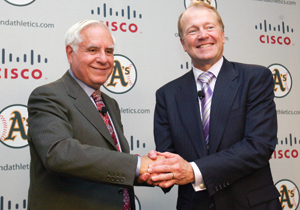 |
Wolff with Cisco CEO John Chambers in 2006
Photo by: GETTY IMAGES
|
■ What is the status of the old ballpark drawings we all saw several years back, and the planned technology integration with Cisco? Is that all still ready to go if you get permission to move?
WOLFF: We’re not sitting with working drawings. But we have one of the most interesting designs I think in baseball. It’s sort of sitting in the closet. And we have to get it out of there. It’s a series of neighborhoods. Wherever you sit, it’s a little bit of a different experience. We’ll have a lot of technology. Lots of digital signage. All the concessions will be digital to the point that when it’s time to stop serving beer, you just press a button and that disappears. The ability to change prices if you’ve got too many hot dogs. A lot of that little stuff. We’ll also have a large series of four-person boxes. Smaller luxury boxes instead of these mega-boxes. And we’re not averse to stealing other good ideas from other ballparks.
■ How do you split your time between baseball and your other activities?
WOLFF: I didn’t realize baseball would take up as much time as it does. But [Beane] and I communicate every day. There’s a lot of day-to-day stuff. Jerry Reinsdorf warned me, and so did Bud, and said, “You’ll be busier than you think.” Something comes up all the time. But most of it’s fun.
■ You’ve had a lot of front office stability, even with the ballpark situation. Dozens of staffers have been with the club for well more than a decade, predating your arrival in ’05. How have you tried to engender that?
WOLFF: We’re fortunate we inherited a very well-run organization. We haven’t had too many changes. I’m sure other teams would say the same, but we have a family feeling that I enjoy a lot. And people actually work harder when they feel comfortable. My theory is that if you’re driving to work and four of five days of the week you look forward to going there, you’re in the right job. And some of our people work seven days a week during the season. But what we’ve got is basically a homespun kind of feeling in what is a very visible activity.
■ Outside of owners’ meetings, how much are you in contact with other team owners?
WOLFF: Not as much as I’d like. I don’t engage in the trades or the agents, and that part of it. Some other owners do, and have a long history of that. But I do enjoy a number of the other owners. Mark Attanasio lives in my area. I like Arte Moreno a lot. The guys who run Boston I have lot of fun with. Every time I go to dinner with them and they pay, I joke that it’s additional revenue sharing. I talk to Jerry Reinsdorf and Bud a lot. There’s a lot of great people in the group now.



